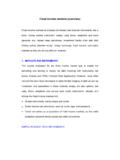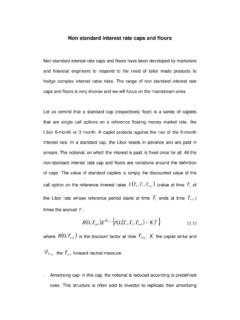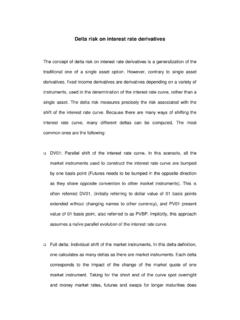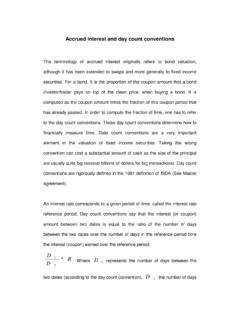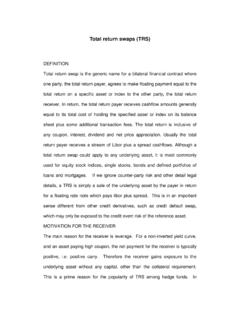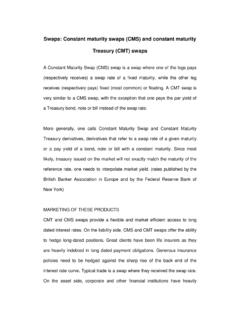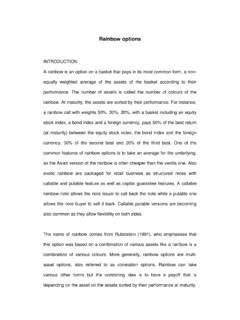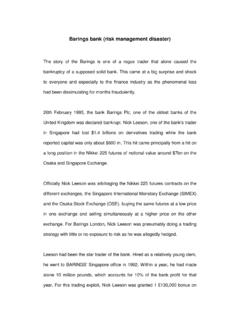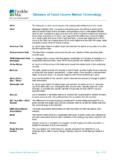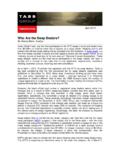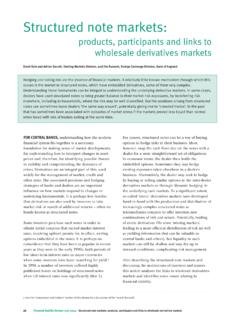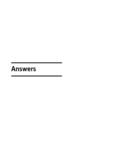Transcription of Over-the-counter (OTC) options market conventions
1 Over-the-counter (OTC) options market conventions This article details the conventions used for Over the counter options1. These conventions are important; as a very substantial amount of traded derivatives is OTC. For instance, for the years 2000-2002, the OTC derivatives market was three times bigger (in term of notional) than the exchange traded one. In particular, this article focuses on: The pricing and quote conventions of the various exotic options (in the currency, equity, commodity, fixed income and credit derivatives market ). The conventions and methods used for fixing and settlement dates. The way settlement is effected.
2 How OTC deals are traded? OTC deals are the result of discussion and negotiation between two counter - parties, without the intervention and/or regulation of a market -exchange. The terms and conditions of the trades are completely deal-specific and are formalised by a legal document called the confirmation document2. Typically in an OTC deal, the two counter -parties will first discuss and negotiate the nature of the deal. Once the bank and the client3 are about to agree on the various terms of the transaction, the salesforce or marketing team of the bank that covers the client, will send to the client a termsheet that 1. Commonly referred to as OTC options 2.
3 Also referred to as confirm. 3. the client can be a financial institution, a corporation or a private investor. describes in greater length the conditions of the contracts as well as the conventions used for the determination of the cashflows paid or received in the structure. provides an indicative price for the structure. If the client wants to execute the deal, she/he will call the sales-person, who in terms will ask the trading desk for a live quote. If the client agrees on the terms and price of the trade, the deal is done. The bank then issues a confirmation document. This is a legal document that describes the terms and conventions of the deal and in particular the option's premium if any.
4 It binds the two entities. To be valid, the confirm has to be signed by appropriate and legally responsible representative of the two counter -parties. In case of disagreement, it would be the main reference document. In OTC deals, it is also quite common for vanilla structures to go through a broker. Typically, a bank that wants to trade an OTC contracts may contact a broker and provides her/him a bid and/or an offer quote. The broker will in terms contact the various banks to get the best quotes. market convention for various markets interest Rate market interest rates products are highly dependent on market convention . In particular, when paying an interest rate over a period, it is important to specify not only the date and time of the fixing of the rate but also the period over which the rate is accrued, as well as the settlement date for the payment.
5 To get agreements on market standards, the International swaps Dealer Association (ISDA) issued official guidelines about market conventions for OTC products, first in the 1991 ISDA definitions, later in the 1997 ISDA. Master Agreements and the 1998 ISDA Supplement. These documents describe in particular the conventions for day count fraction, calendar to use, settlement date, period determination and calculation, rate fixing, for short and long first and end period computation. Typical day count fractions are Actual/Actual, Actual/365(Fixed), known as bond basis in the United States, Actual/360, known in the United States as money market basis, 30/360, 30E/360, 30E+/360 (see day count fractions).
6 Less common but still used conventions are the ISMA and AFB convention for day count fraction. Below is provided a table of usual conventions used for OTC transactions in the interest rate market . Ccy EUR USD GBP JPY CHF SEK. Floating day count actual/360 actual/360 actual/365 actual/360 actual/360 actual/360. Fixed rate day count isda30/360 isda30/360 actual/365 actual/365 isda30/360 isda30/360. Calendar TARGET NewYork|London London Tokyo|London Switzerland Sweden Fixing period 2b 2b 0b 2b 2b 2b Fixed rate frequency annual- semi-annual semi-annual semi-annual annual annual Floating frequency semi-annual quaterly semi-annual semi-annual semi-annual quaterly Table 1: Main conventions for the interest rate market FX market : The convention is to use the legal entity for reference rate.
7 Publishing entity are for instance the ECN for Euro rates . Standard market convention for USD/CAD trade is to settle the next business day, while for all the other currency (both against the USD and against CAD), the market convention is two business days settlement. Other Markets: Equity, Commodity Credit Derivatives and Fund Derivatives. The equity and commodity market conventions for OTC deals are often the one used by the exchange contracts underlying the transaction. Typical settlement time is between two to three business days. For Credit derivatives, as it is a young market , dealers widely refer to the ISDA Master document for convention about credit event and other credit related definition as well as extensive documentation in their termsheet and confirm.
8 For the derivatives on illiquid assets such as funds, the conventions are the result of one-by-one negotiation, and need to take into account the frequency and availability of market information on these assets. Payment Date conventions The most common procedure to determine payment date is known as Modified Following. Under this convention , when a payment date falls on a weekend or bank holiday, the next good business day should be picked as long as it is in the same calendar month. If the weekend causes the payment date to roll into the next month, the payment date is moved back to the last good business date of the previous month.
9 Other methods are following which just takes the net business day according to the transaction calendar, preceding and modified-preceding. Payment dates specification may also use the International Money market or IMM days, which are the third Wednesday in March, June, September and December. Quote conventions Each market has its own terminology and we only give the examples of two typical markets, the FX and interest Rate markets. FX market The Foreign Exchange market is a good example of an OTC market where the professional dealing language and convention are widespread recognized and used. In the spot FX market , quotations use extensively the terms Mine' and Yours'.
10 To buy and sell the base currency against the counter -currency for spot delivery. By convention , the dealer always talks and refers to the base currency and deals in million. He also provides the bid and offer simultaneously. For instance, if the spot Dollar/Yen was quoted 121 15-20 in 10, the above spot deal proposal would be to buy 10 million of USD at If the dealer replies 5 Yours', this would mean that he sells 5 Million of USD. for spot delivery at Similarly in the Forward FX markets, a reply of Mine to a quotation on forward points of say 70-60 for 3 months USD/CHF in 10, would mean that the dealer would sell 10 Millions USD for spot delivery and buy 3months forward on the same amount at a premium of CHF Centimes.
